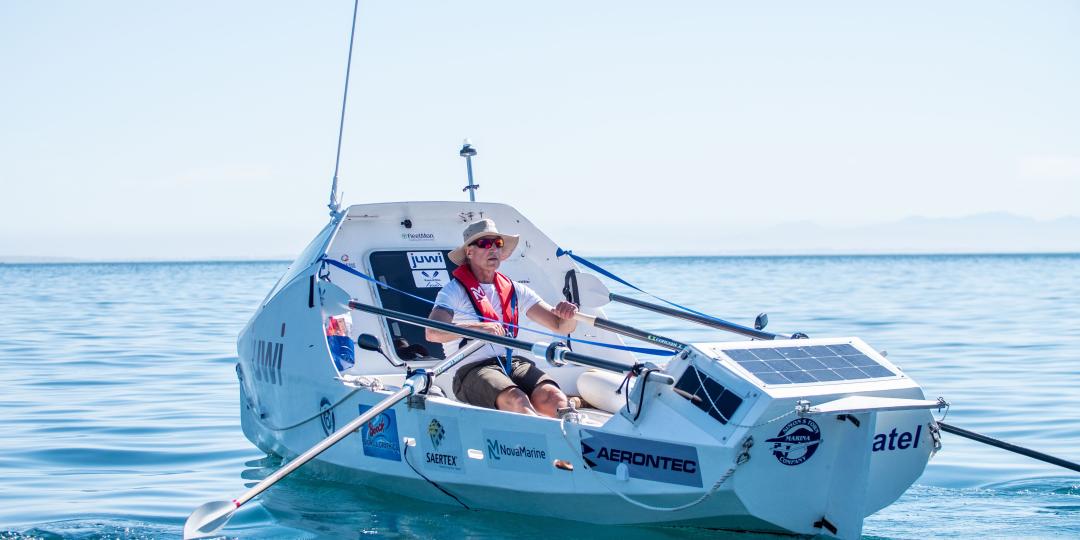Extreme South African adventurer, Zirk Botha (59) has passed the three-quarter mark in his transatlantic ocean row from Cape Town to Rio de Janeiro, a total distance of 4000 nautical miles (nm), equivalent to 7200 km. He is the first person to attempt the journey, rowing alone and unsupported by any safety craft, and his pace is setting records which will be hard to beat.
“I am making good progress and getting closer to the Brazilian coast. I’ve completed 3000 nm in under eight weeks, which equates to a daily average of 58 nm (about 104 km), with an average speed of 2,48 knots (4,6 km/h). The weather forecast is in line with my weather routing prediction, so the plan is working. I still have another 1000 nm (1850 km) to go, so I won’t be slowing the pace.” said Botha.

Botha has remained healthy and strong, except for a slight strain to his right knee, but this is recovering well. Zirk comments: “I found that by raising the seat slightly, using extra foam padding and not rowing to my full leg extension, the pain has gone away and I am back to normal.”
As he reaches the Brazilian coastline, he will have to navigate around Trindade Island, fishing areas and oil fields:
“I want to stay far north of Trindade Island and the fishing banks. The sea conditions will get worse over the shallows and there might be fishing vessels. I intend to pass inshore of the banks, have the NE from astern and to pass just inshore of the southerly oil fields.”
Marine life
Botha has been out at sea alone and unsupported, aside from a few passing ships in the distance and only occasional sightings of marine life: “Early on my voyage I spotted a large sunfish. Near halfway, I saw the two dolphin pods and two marlin – I spotted a small marlin, about 1,5 m, but it was very skittish and swam off very quickly. The big marlin I saw was stunning. It passed very close to the boat, but didn't stick around. My highlight was the one pod of dolphins that played around Ratel for about 10 minutes.”
Rowing for a sustainable future
Sponsored by juwi Renewable Energies, Zirk Botha is rowing in support of sustainable development and to promote renewable energy as a solution to environmental issues and climate change. “I want to use #Row2Rio2020 to spotlight the impact of fossil fuels and irresponsible consumerism on the planet, which will be the home of our children and future generations. Renewable energies are essential to a sustainable future.”
“During my entire row I have to be 100% self-sustaining. This provides a perfect showcase to support the message that 100% renewable energy is the solution. I am totally reliant on solar panels and solar-charged batteries as the source of electricity for my water maker (desalinator), auto-pilot, safety equipment, radio and satellite communications equipment.”
Richard Doyle, CEO of juwi Renewable Energies, who sponsors of the trip, applauds Botha: “What Zirk is doing is remarkable from an individual perspective. However, it is really symbolic because it is a proxy for the greater effort we all need to make both individually and collectively if we are to realise sustainability.”
“Renewable energy made up 28% of the global total last year, up 2% on the previous year. There is a steady shift investment appetite away from fossil fuels and this percentage will only increase.”
“The company’s vision is 100% renewable energy, and it is increasingly clear that many businesses can get there with energy management and storage. Zirk is a mini-example of this with the sun providing all of the navigation, communications and other electronic functions for his trip,” adds Doyle.

What makes Row2Rio2020 different?
The trip is the first solo, unsupported, attempt to row the 7200 km route from Cape Town to Rio de Janeiro. The route very similar to that of the Cape to Rio Yacht Race.
Zirk Botha initially had no big sponsorship to buy a fully equipped ocean rowing boat, so he had to teach himself how to do epoxy work and built the boat in his garden: “I fitted all equipment myself and did all the electrical wiring. Which was also something I had to teach myself to do,” said Botha.
No other solo rower has made this transatlantic row, which includes coping with the Cape of Storms: “As a solo rower I am on my own and have to deal with all physical, mental and emotional challenges by myself, with no shoulder to cry on. I have to navigate myself and there is no one to keep a visual lookout for ships or changes in weather conditions while I am sleeping, so my sleeping time is impaired.”
When not rowing, Botha makes water, cleans the hull and does general maintenance, as well washing laundry. These chores impact on the time he has available to rest or sleep.
"I have always been inspired by the South Africa solo adventurers like Mike Horn and Pete van Kets. Being solo adventurers has set them apart in their ability to face and deal with challenges in often hostile environments without any outside assistance, and in this regard Mike Horn stands head and shoulders above the rest globally," said Botha.
About the boat
The current norm is for ocean rowing boats to be built from marine plywood or in a fibreglass and epoxy mould. Ratel differs from this in that she is built on a design by Phil Morrison using closed cell foam overlaid with fibreglass and epoxy resin.
The specific design incorporates honey comb construction principles which ultimately makes it very strong and super light.
“Before I started fitting hatches and equipment, I could lift and turn Ratel by myself with one end on the cradle. With all equipment, spares and food loaded, she weighs 550 kg. With a length of 6,5 m and beam of 1,62 m she is super light,” said Botha.
“To operate my systems I have two 12 V batteries connected in parallel with a combined capacity of 200 Ah. These are deep cycle batteries suited for charging with solar panels.
I chose Solbian flexible solar panels because of their good track record on yachts and boats. Although they have a peak capacity of 276 W at 46 V, they deliver half of that, at best, because they are positioned at various angles to cater for morning, midday, and afternoon sun. They have consistently delivered even on overcast days, such that my batteries have been fully charged every day by sunset.
“Fitted onboard Ratel is a desalinator unit which provides my fresh water. The Eco Systems Splash unit can make 16 l of fresh water per hour. It runs off 12 V and requires a 16 A supply.
Besides the desalinator, my most important unit is my VHF radio equipped with a GPS, AIS and DSC facility. The AIS allows me to get early warning of ships in my vicinity whilst the DSC allows me to communicate with them similar to as by SMS. I am also able to call ships on normal maritime channels.
About Zirk Botha
A maritime and adventure background – ZirkBotha served as a Naval Combat Officer in the South African Navy for 17 years, where he also qualified as a Combat Diver. During his time in the navy, he completed three Atlantic crossings. He is also a qualified 200T Yacht Captain (Master of Yachts) and has sailed extensively.
Botha is an avid adventure racer, competing in many multi-day non-stop events which comprise trail running, rock climbing, river rafting and mountain biking. His many adventures include trekking the Himalayas, and stand-up paddle boarding through the Okavango Delta, of Botswana.
A selection of videos are available on the juwi RE SA You Tube Channel:
https://www.youtube.com/channel/UCggW0_dDYWkf08fEFkG5g7g
Click here to follow his progress in real time
Follow his Facebook page: Zirk Botha - Live a Great Adventure https://www.facebook.com/ZirkBotha.FB
Hashtags: #Row2Rio2020 #ZirkBotha
Instagram: @zirk_botha https://www.instagram.com/zirk_botha/
website: www.zirkbotha.co















